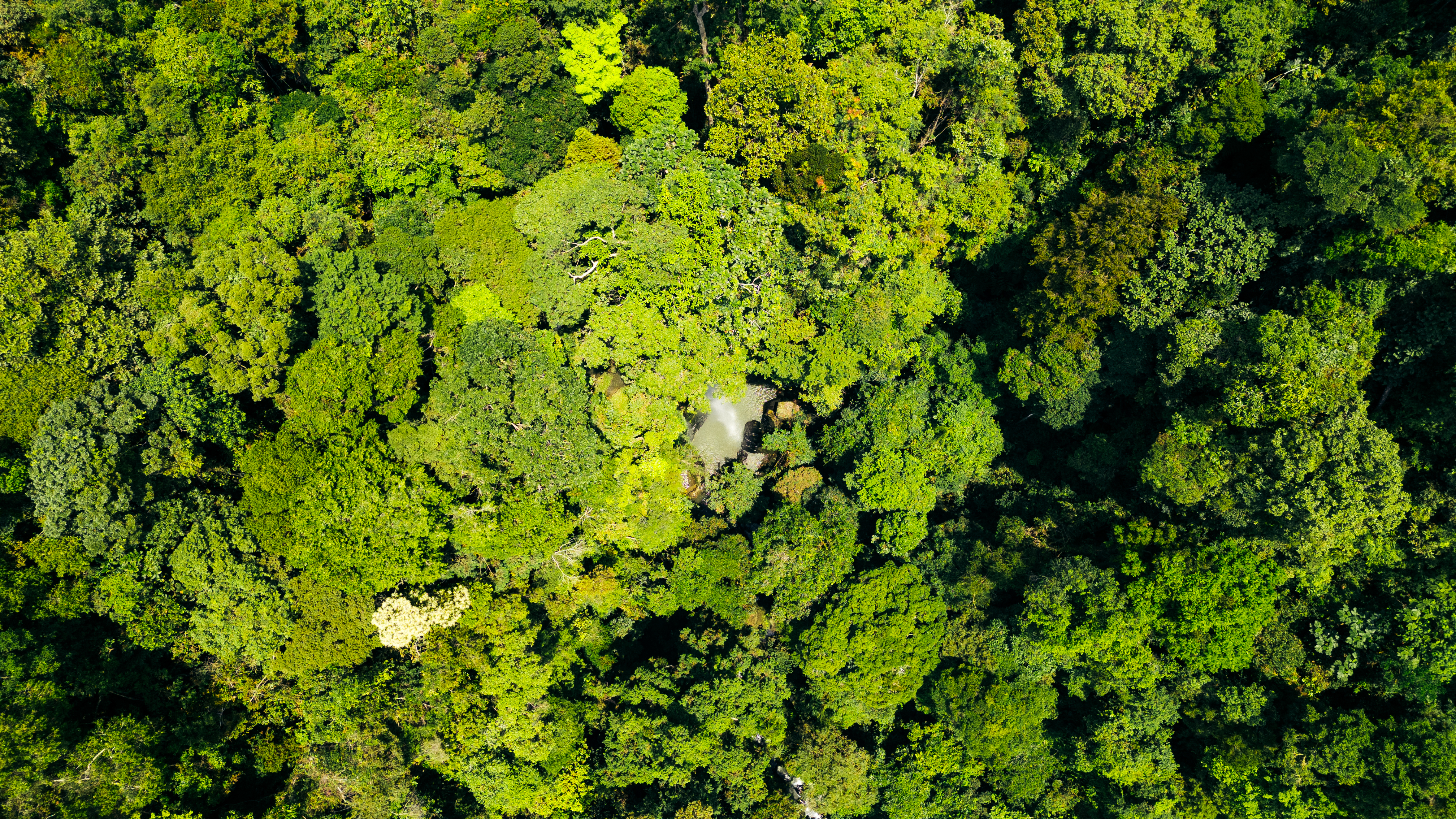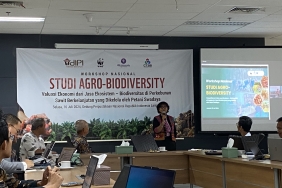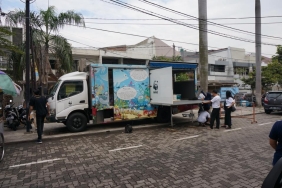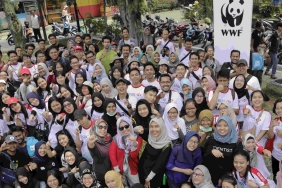GOVERNMENTS AND BUSINESS MUST UNITE IN JOINT ACTION TO STOP FOREST LOSS
April 27, 2011
Jakarta (27/04)-A study released by WWF suggests that policymakers and businesses immediately support targets to stop forest destruction as part of efforts to conserve biodiversity and prevent climate change.
The first chapter of the Living Forests Report, released today, examines the drivers of deforestation and identifies opportunities to transform "business as usual" into a sustainable model that benefits governments, businesses, and communities. The report is based on the research of WWF's "Living Forests Report," which is released today.
The report builds on global research that concluded that more than 230 million hectares of forest worldwide will be lost by 2050 if no action is taken. To anticipate this, the WWF report recommends that policymakers and business leaders unite to achieve "Zero Net Deforestation and Forest Degradation" (ZNDD) by 2020 as a starting point for global initiatives to mitigate climate change and prevent biodiversity loss.
"The current unwise use of forests is due to our failure to create policies and economic incentives for forest conservation," said Rod Taylor, Director of Forestry at WWF-International.
Forest sustainability is crucial for business and government
The first chapter of the "Living Forest" report was released as business and political leaders met in Jakarta for the Business 4 Environment Global Summit (B4E). The conference will also be attended by the President of the Republic of Indonesia, Susilo Bambang Yudhoyono.
The Living Forest Report underscores that the world's need for "Zero Net Deforestation and Degradation" and the simultaneous availability of raw materials - energy are both challenges and business opportunities for forest products. Forest products are renewable, and when derived from well-managed forests and plantations have a lower footprint than iron, concrete and oil-based plastics.
On the first day of the conference, businesses from the forestry, mining, and oil palm plantation sectors operating on the island of Borneo will meet in the "Heart of Borneo Green Business Network" organized by WWF. In the B4E conference, WWF will be hosting an event on the island of Borneo.
In the B4E conference, WWF will invite companies in the forestry sector to join the Global Forest and Trade Network initiative, as well as invite other business sectors to support the achievement of 75% certification of key global commodities in the region by 2020. More than 40% of the forests on the island of Borneo are under concession to private companies, with around 23% (6 million hectares) under forest industry management.
Carrefour, one of Indonesia's largest retail businesses is answering this call through its support of WWF's Global Forest & Trade Network (GFTN) initiative. Today, the Carrefour group's two largest suppliers of tissue paper in Indonesia, PT Graha Kerindo Utama and PT Graha Cemerlang Paper Utama committed to implement sustainable business under the Forest Stewardship Council (FSC) scheme. "Our ambition is simple and strong.
"Our ambition is simple yet powerful: to be the retailer of choice. This can only be achieved by managing our retail company responsibly and sustainably," explained RM Adji Srihandoyo, Corporate Affair Director of PT CARREFOUR Indonesia.
Heart of Borneo - a collaboration model
In recent years, more and more businesses have embraced sustainable forest management while governments continue to strengthen land use criteria and develop economic and fiscal incentives, particularly in Borneo, an island with one of the world's largest forest cover.
WWF and its partners on the ground are supporting these efforts by developing pilot models to demonstrate the feasibility of such a collaborative approach. "In the Heart of Borneo region of Borneo, the government is working to strengthen land use criteria and develop economic and fiscal incentives.
"In the Heart of Borneo region, tangible evidence of the success of this approach is emerging. WWF-Indonesia recognizes that sustainable mechanisms cannot be achieved instantly. Therefore, we invite the business sector to join us in paving the way to a sustainable economy and low carbon development, not only in Kalimantan, but also in Sumatra and Papua. One step at a time," explained Dr. Efransjah, Executive Director of WWF-Indonesia.
An area of 220,000 km has been earmarked for conservation and sustainable development in the Heart of Borneo. This is where the idea of harmonizing conservation and economic development is being applied.
ZNDD is no barrier to sustainable forest sector business
Zero Net Deforestation and Forest Degradation by 2020 means no reduction in overall forest area or degradation of forest quality. By this definition, new monoculture plantations cannot replace lost primary forest. The ZNDD target is to reduce the rate of clearing of both natural and secondary forests to zero, down from the current rate of 13 million hectares per year, and to stay at zero.
To interpret this idea in practice, WWF developed the "Living Forests Model" together with the International Institute for Applied Systems Analysis (IIASA). It is this model that serves as the basis of the "Living Forest Report."
Using the calculations of the Living Forest Model, it is projected that more than 230 million hectares of the world's forests will be lost between now and 2050. "The Living Forest Model shows that forest conservation is possible and important. But the process is not easy," Taylor said.
Making changes now through to 2050
"Better governance and economic incentives will enable strong oversight mechanisms in the forest sector and more productive use of degraded land," Taylor said. This, he said, would ensure land is available for agriculture, plantations and sustainably managed forests to meet global demand for timber and food without sacrificing forests.
The report concludes that sustaining zero forest loss in the long term will require efforts given the high pressures forests face due to increasing demand for food, materials and fuel for a growing population, estimated at 9 billion people by 2050. "In the short term, preventive measures can help to reduce forest loss.
"In the short term, avoided deforestation can be achieved through good governance," Taylor continued. "But if we look at the long-term projections, by 2050 with a population of 9 billion, we will need to reduce overconsumption, waste of food and energy, and increase agricultural and forestry productivity to reduce forest clearing to near-zero levels." Deforestation prevention measures can be achieved through good governance," Taylor said.
Note to Editor
The B4E Summit, organized in partnership with Global Initiatives, WWF and the Government of Indonesia, aims to "generate collaborative solutions to solve the environmental and climate problems facing the world today."
The remaining chapters of the Living Forest Report will be released in phases over the course of the year to form a unified analysis of the returns that forests will require in the future, for people and the environment.
More information:
- Nazir Foead, WWF-Indonesia Policy Director, nfoead@wwf.or.id, +62 811977604
- Irwan Gunawan, WWF-Indonesia, igunawan@wwf.or,id, +628128748535
- Desmarita Murni, Communications Manager, dmurni@wwf.or.id, +62811793458
The full Living Forest report can be accessed at panda.org/livingforests.





